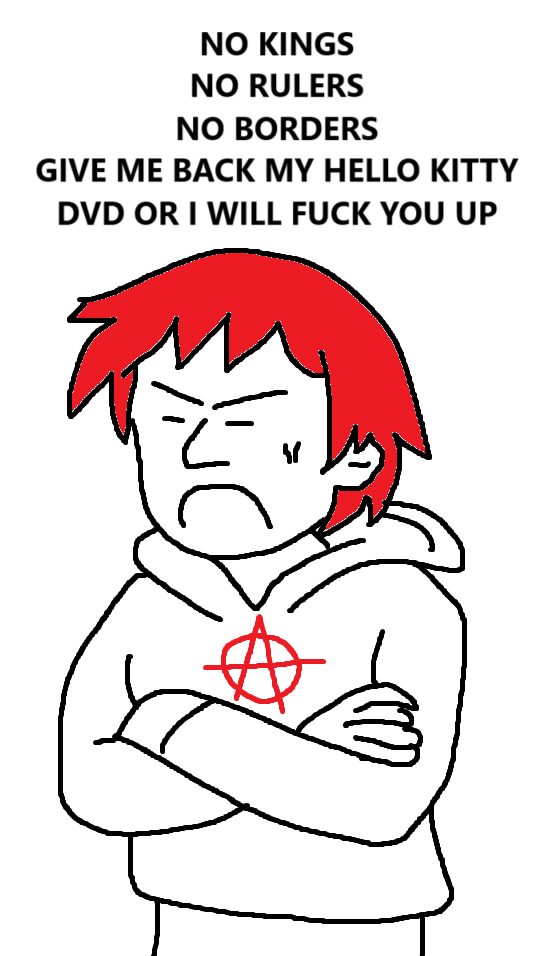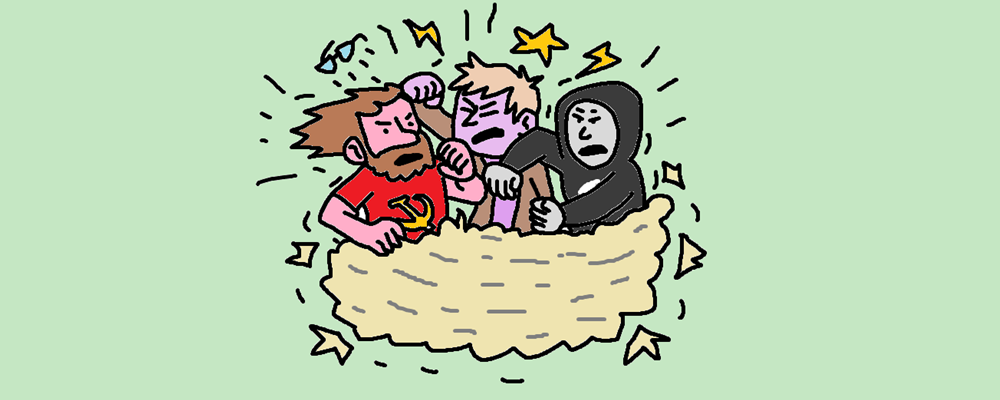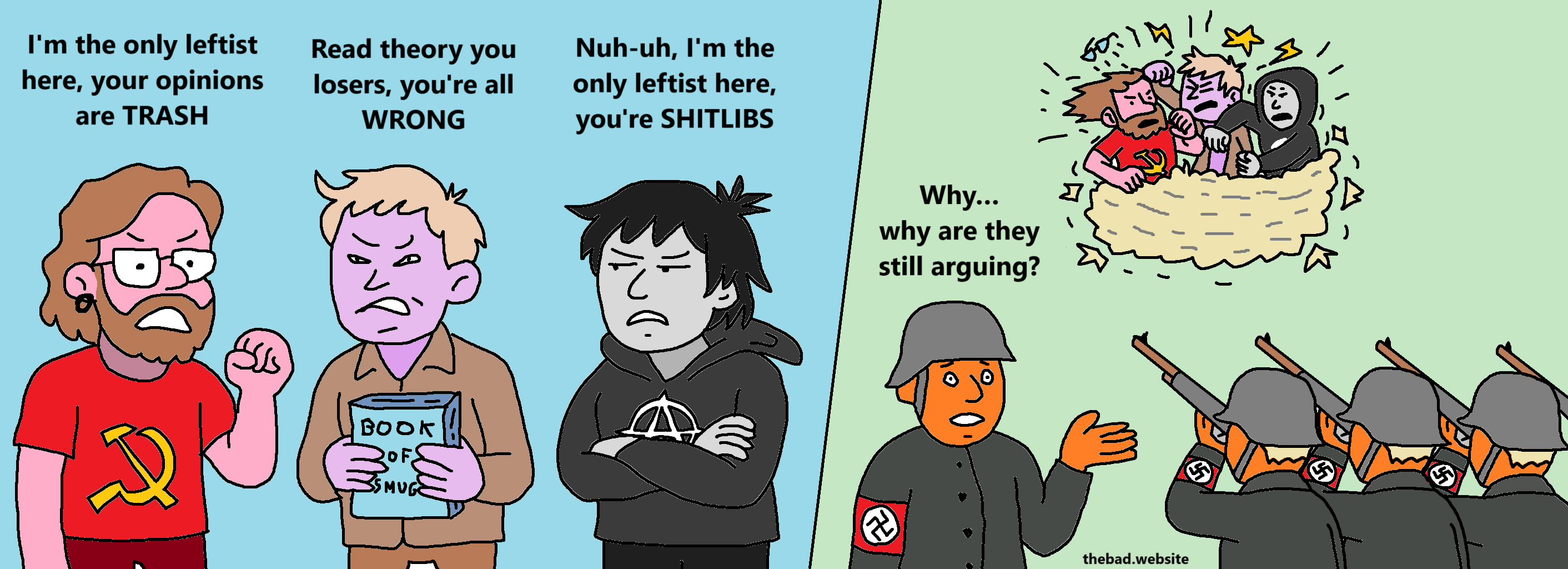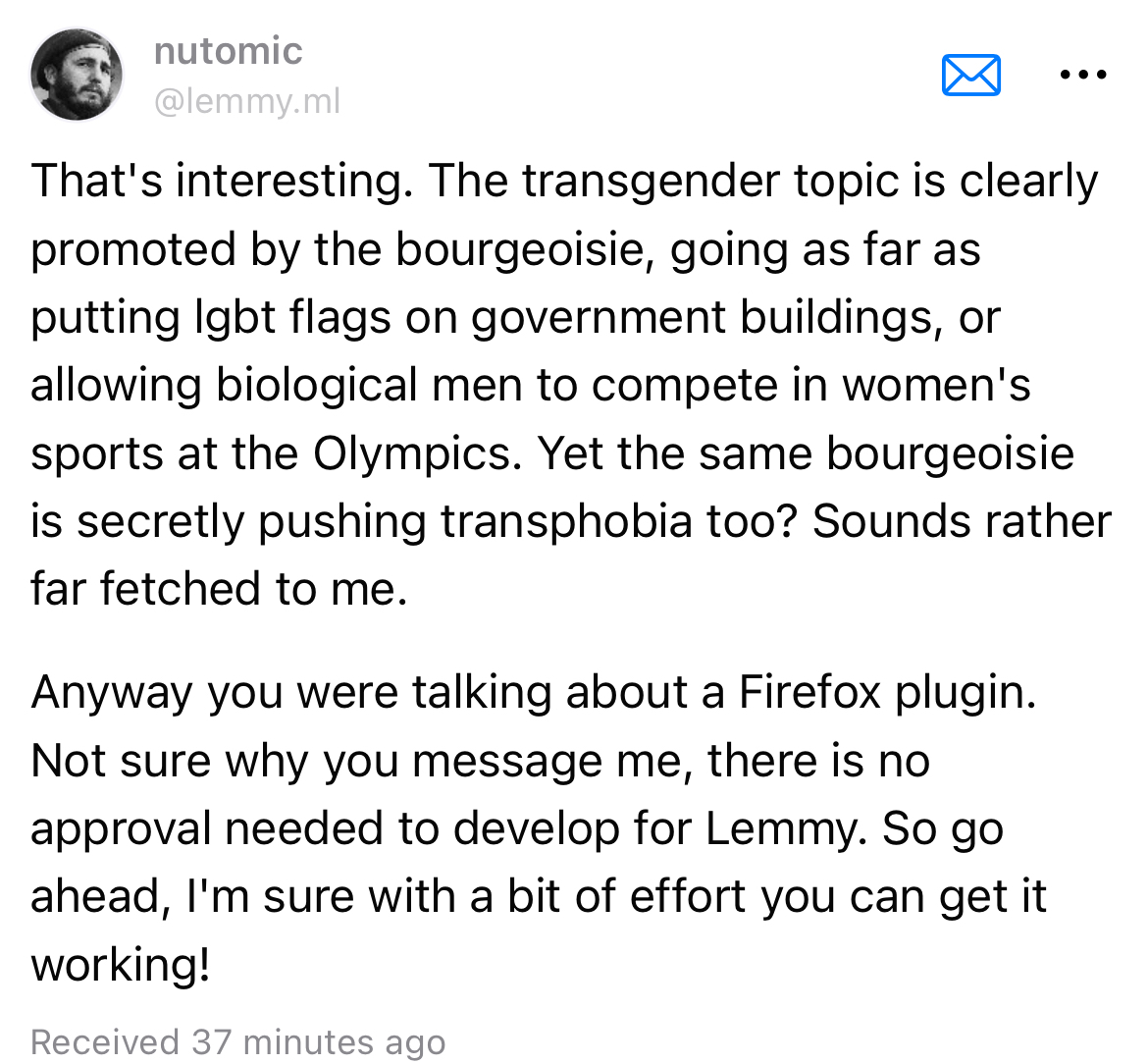Infighting
-
I’m saying it because I’ve seen them make the same argument, as I have done myself, in different ways.
Then maybe you didn't read the conversation
Or maybe I did, and I disagree with your interpretation.
-
The communists were never "buddies" with the Nazis. The communists spent the decade prior trying to form an anti-Nazi coalition force, such as the Anglo-French-Soviet Alliance which was pitched by the communists and rejected by the British and French. The communists hated the Nazis from the beginning, as the Nazi party rose to prominence by killing communists and labor organizers, cemented bourgeois rule, and was violently racist and imperialist, while the communists opposed all of that.
When the many talks of alliances with the west all fell short, the Soviets reluctantly agreed to sign a non-agression pact, in order to delay the coming war that everyone knew was happening soon. Throughout the last decade, Britain, France, and other western countries had formed pacts with Nazi Germany, such as the Four-Power Pact, the German-French-Non-Agression Pact, and more. Molotov-Ribbentrop was unique among the non-agression pacts with Nazi Germany in that it was right on the eve of war, and was the first between the USSR and Nazi Germany. It was a last resort, when the west was content from the beginning with working alongside Hitler.
Harry Truman, in 1941 in front of the Senate, stated:
If we see that Germany is winning we ought to help Russia, and if Russia is winning we ought to help Germany, and that way let them kill as many as possible, although I don’t want to see Hitler victorious under any circumstances.
Not only that, but it was the Soviet Union that was responsible for 4/5ths of total Nazi deaths, and winning the war against the Nazis.
Not gonna mention the Secret Protocol in the Molotov-Ribbentrop pact that enabled the partition of Poland and the Baltics?
Or that Stalin actually fell for it all, trusted Hitler, disregarded all evidence of Nazi troop buildup until the day of Operation Barbarossa? Then Stalin spent weeks disappeared from public view.
Credit to the Soviets for defeating the Nazis. WW2 would have been lost without them. But they also acted as imperialists in reattaching Tsarist colonies to Russia, dividing Poland and the Baltics with Hitler, invading Finland, not to mention all the puppet states created postwar.
-
Politicians have to work their way up the rungs in order to increase their scope of decisionmaking,
i think u misunderstand the delegate model i described.
what youre describing is a hierarchical system where the higher up the "rungs" u go, the larger the scope of decisions u can make.
whereas in the delegate model, the maximum scope of decisions is always directly with the people (who could make any decision independently of delegates, if they want to), and every delegate has decision-making power smaller than that scope, meaning the scope of possible actions decreases rather than increases.
Hierarchy isn't something antihetical to socialism, it exists in all systems. Further, I still don't really see how this model handles global systems of production and supply chains, and further still, I think you're just redefining socialism to only include anarchism, which is a semantical argument and not a logical one.
-
Not gonna mention the Secret Protocol in the Molotov-Ribbentrop pact that enabled the partition of Poland and the Baltics?
Or that Stalin actually fell for it all, trusted Hitler, disregarded all evidence of Nazi troop buildup until the day of Operation Barbarossa? Then Stalin spent weeks disappeared from public view.
Credit to the Soviets for defeating the Nazis. WW2 would have been lost without them. But they also acted as imperialists in reattaching Tsarist colonies to Russia, dividing Poland and the Baltics with Hitler, invading Finland, not to mention all the puppet states created postwar.
No, because there was never an agreement about partitioning. It was about spheres of influence, which Nazi Germany broke, and further the USSR entered Poland weeks after the Nazis invaded in order to prevent the entirety of Poland from falling to the Nazis, largely sticking to areas only a few decades prior Poland had invaded and annexed.
There's also no evidence the Soviets didn't expect the Nazis to invade. They didn't get the timeframe right, but they expected it the entire time. And no, the Soviets weren't imperialist.
-
[dude with glasses in a communist t-shirt, arguing]
I'm the only leftist here, your opinions are TRASH[dude holding a theory book on smug, arguing]
Read theory you losers, you're all WRONG[dude in an anarchist hoodie, arguing]
Nuh-uh, I'm the only leftist here, you're SHITLIBS[the three dudes are now caught in a cartoon fight, glasses gone flying, punches everywhere, while a firing squad of nazis are targeting them with rifles]
[a confused nazi asks]
Why… why are they still arguing?

Infighting | The Bad Website
Infighting - A comic on The Bad Website
The Bad Website (thebad.website)
The People's Front of Judea vs the Judean People's Front
-
Hierarchy isn't something antihetical to socialism, it exists in all systems. Further, I still don't really see how this model handles global systems of production and supply chains, and further still, I think you're just redefining socialism to only include anarchism, which is a semantical argument and not a logical one.
as a communist, i believe there is such a thing as a non-hierarchical system.
further, i dont really see how the PRC will ever achieve communism or socialism and further still, i think you are redefining socialism to include china, which is a semantical argument and not a logical one.
-
People, people, people, we can kill each other AFTER the fascist are gone, please and thank you.
Chinese civil war be like:
-
as a communist, i believe there is such a thing as a non-hierarchical system.
further, i dont really see how the PRC will ever achieve communism or socialism and further still, i think you are redefining socialism to include china, which is a semantical argument and not a logical one.
Communism is generally held to be about class and state abolition, not hierarchy in general. Delegates in your model still have hierarchy, what's important is accountability and that the general interest is upheld. As for the PRC, it's already socialist, the large firms and key industries are publicly owned. It certainly isn't anarchist, nor is it a stateless, classless, moneyless, global society, but it's socialist.
-
Communism is generally held to be about class and state abolition, not hierarchy in general. Delegates in your model still have hierarchy, what's important is accountability and that the general interest is upheld. As for the PRC, it's already socialist, the large firms and key industries are publicly owned. It certainly isn't anarchist, nor is it a stateless, classless, moneyless, global society, but it's socialist.
Communism is generally held to be about class and state abolition
which are hierarchies, and the criticism of these are based on the same root issue that all hierarchies have. i admit that this statement was somewhat inflammatory, altho i firmly believe that anarchism is the natural conclusion of the communist idea.
Delegates in your model still have hierarchy,
no. the power is always among the people who choose the delegate, formulate their mandate, and can recall them at any time.
the delegate has no power over the people, nor is the delegate coerced into their role.and u can call the PRC socialist all u like, but that still dont make it true.
-
Communism is generally held to be about class and state abolition
which are hierarchies, and the criticism of these are based on the same root issue that all hierarchies have. i admit that this statement was somewhat inflammatory, altho i firmly believe that anarchism is the natural conclusion of the communist idea.
Delegates in your model still have hierarchy,
no. the power is always among the people who choose the delegate, formulate their mandate, and can recall them at any time.
the delegate has no power over the people, nor is the delegate coerced into their role.and u can call the PRC socialist all u like, but that still dont make it true.
wrote last edited by [email protected]Inter-class hierarchy exists, ie bourgeois and proletarian, but intra-class hierarchy also exists, ie worker and manager. The Marxist critique of class involves the fact that there's hierarchy, but that's not the focus, the focus is on class as a social relation to production as informed by ownership. I'm more than willing to agree that your critique is the general anarchist critique, and I'm okay with you preferring anarchism, I just think that if you're trying to argue that Marxism isn't a communist ideology because it doesn't hold the same view of hierarchy as anarchism does, that that's a bit myopic.
no. the power is always among the people who choose the delegate, formulate their mandate, and can recall them at any time. the delegate has no power over the people, nor is the delegate coerced into their role.
Just because the delegate was elected and is subject to recall doesn't mean it isn't a hierarchy, though. Unless your point is that the delegate can only do what 100% of those who elected them want, and if any oppose them then they have no power, but in that case everything would collapse to a halt. The PRC has delegates and elections, and recall elections too, so I'm not sure I understand your criticism with that.
As for not considering the PRC socialist, are you saying it doesn't fit the anarchist conception of socialism, or the conception of socialism that includes Marxism as socialist? Ie, is your argument that the PRC does not meet the Marxist understanding of socialism as well as the anarchist? This is something that needs heavy judtification if so, but if you just mean the anarchist conception then I agree, the PRC isn't anarchist and isn't pretending to be.
-
Inter-class hierarchy exists, ie bourgeois and proletarian, but intra-class hierarchy also exists, ie worker and manager. The Marxist critique of class involves the fact that there's hierarchy, but that's not the focus, the focus is on class as a social relation to production as informed by ownership. I'm more than willing to agree that your critique is the general anarchist critique, and I'm okay with you preferring anarchism, I just think that if you're trying to argue that Marxism isn't a communist ideology because it doesn't hold the same view of hierarchy as anarchism does, that that's a bit myopic.
no. the power is always among the people who choose the delegate, formulate their mandate, and can recall them at any time. the delegate has no power over the people, nor is the delegate coerced into their role.
Just because the delegate was elected and is subject to recall doesn't mean it isn't a hierarchy, though. Unless your point is that the delegate can only do what 100% of those who elected them want, and if any oppose them then they have no power, but in that case everything would collapse to a halt. The PRC has delegates and elections, and recall elections too, so I'm not sure I understand your criticism with that.
As for not considering the PRC socialist, are you saying it doesn't fit the anarchist conception of socialism, or the conception of socialism that includes Marxism as socialist? Ie, is your argument that the PRC does not meet the Marxist understanding of socialism as well as the anarchist? This is something that needs heavy judtification if so, but if you just mean the anarchist conception then I agree, the PRC isn't anarchist and isn't pretending to be.
ok this gotta be my last response bc i got better shit to do today.
so first off, i simply dont care what the marxist definition or critique of something is, so yes, please understand it as just the general anarchist critique.
Unless your point is that the delegate can only do what 100% of those who elected them want,
well yes, if they want to stay a delegate they have to comply with the mandate they were given.
i also understand that there may be practical considerations that lead ppl to choose weak (e.g. 95%) consensus decisions, and u can call that hierarchical if u like, but that doesnt mean we shouldnt strive to abolish all hierarchies.the way u have described the PRC does not sound like they have delegates, rather representatives. ive already explained the difference.
as for considering the PRC state capitalist, this is my conception (altho i know a few marxists who agree), and so far ive only argued about the ownership situation and not touched upon wealth accumulation or markets at all, but i think ive still made a fair argument.
-
[dude with glasses in a communist t-shirt, arguing]
I'm the only leftist here, your opinions are TRASH[dude holding a theory book on smug, arguing]
Read theory you losers, you're all WRONG[dude in an anarchist hoodie, arguing]
Nuh-uh, I'm the only leftist here, you're SHITLIBS[the three dudes are now caught in a cartoon fight, glasses gone flying, punches everywhere, while a firing squad of nazis are targeting them with rifles]
[a confused nazi asks]
Why… why are they still arguing?

Infighting | The Bad Website
Infighting - A comic on The Bad Website
The Bad Website (thebad.website)
Actually maybe we shouldn't call it "left politics", just "human politics", because it's politics for the human, not for some mega-corps.
-
ok this gotta be my last response bc i got better shit to do today.
so first off, i simply dont care what the marxist definition or critique of something is, so yes, please understand it as just the general anarchist critique.
Unless your point is that the delegate can only do what 100% of those who elected them want,
well yes, if they want to stay a delegate they have to comply with the mandate they were given.
i also understand that there may be practical considerations that lead ppl to choose weak (e.g. 95%) consensus decisions, and u can call that hierarchical if u like, but that doesnt mean we shouldnt strive to abolish all hierarchies.the way u have described the PRC does not sound like they have delegates, rather representatives. ive already explained the difference.
as for considering the PRC state capitalist, this is my conception (altho i know a few marxists who agree), and so far ive only argued about the ownership situation and not touched upon wealth accumulation or markets at all, but i think ive still made a fair argument.
Well, up front, it's nice that you at least cleared up that you don't consider Marxism to be socialist. I disagree with that, of course, but now that we've established that your definition of socialism is exclusionary of Marxism, then that does at least mean we can have a consistent conversation.
As for delegates vs. representatives, the PRC's democracy extends beyond simply voting for candidates and representatives. I already explained that each rung makes decisions for that which their area needs, and elect from among themselves delegates that they can recall. People's integration into politics isn't relegated to simple elections, but consensus building, feedback, drafts of policy, etc.
As for ownership, your argument was that politicians are literally owners of publicly owned industry, which isn't how public ownership works anywhere. Even if the PRC is centrally planned for the majority of its large firms and key industries, that doesn't mean those large firms and key industries are run for profit, personal enrichment of capitalists, participate in markets, etc. There's nothing at all resembling capitalism there, so state capitalism is an absurdity. I gave clear examples of capitalist systems with heavy state involvement, like Singapore, that better fit "state capitalism."
Either way, this will be my last comment too. Have a good one!
-
Actually maybe we shouldn't call it "left politics", just "human politics", because it's politics for the human, not for some mega-corps.
Are you continuing the comic, or making an actual aside?
-
You're just an astroturf. You are what's a stop to any temporary left unity, not those who you accuse with ridiculous strawmen.
I'm not uniting with people who will kill me later. We've done that multiple times. Your ilk always betrays us.
-
Or maybe I did, and I disagree with your interpretation.
I’m saying it because I’ve seen them make the same argument, as I have done myself, in different ways.
-
One of the Lemmy Devs was saying that being transgender was promoted by the bourgeois
wrote last edited by [email protected]Now do the rest
-
I'm not uniting with people who will kill me later. We've done that multiple times. Your ilk always betrays us.
Sounds like you're the one betraying us
-
It's why ranked choice is the only sane voting approach. First past the post heavily favors right wing authoritarians.
wrote last edited by [email protected]Ranked-choice voting is a decent choice for uninominal elections.
Proportional elections are a popular alternative, and they are arguably fairer than even RCV because they are not susceptible to gerrymandering or votes otherwise being weighted by geography (i.e. your vote still matters just as much as anyone's if you live in Redneckville, Mississippi). They do have other downsides though.
Unfortunately here in Belgium we do proportional voting and the Prime Minister is nonetheless a far-right separatist in charge of a right-wing coalition so, uh, maybe FPTP is not the only thing that stands between the citizenry and a communist utopia lol
-
[dude with glasses in a communist t-shirt, arguing]
I'm the only leftist here, your opinions are TRASH[dude holding a theory book on smug, arguing]
Read theory you losers, you're all WRONG[dude in an anarchist hoodie, arguing]
Nuh-uh, I'm the only leftist here, you're SHITLIBS[the three dudes are now caught in a cartoon fight, glasses gone flying, punches everywhere, while a firing squad of nazis are targeting them with rifles]
[a confused nazi asks]
Why… why are they still arguing?

Infighting | The Bad Website
Infighting - A comic on The Bad Website
The Bad Website (thebad.website)
I feel like the nazis should be congratulating themselves on sowing discord, distracting those that could resist with bullshit




